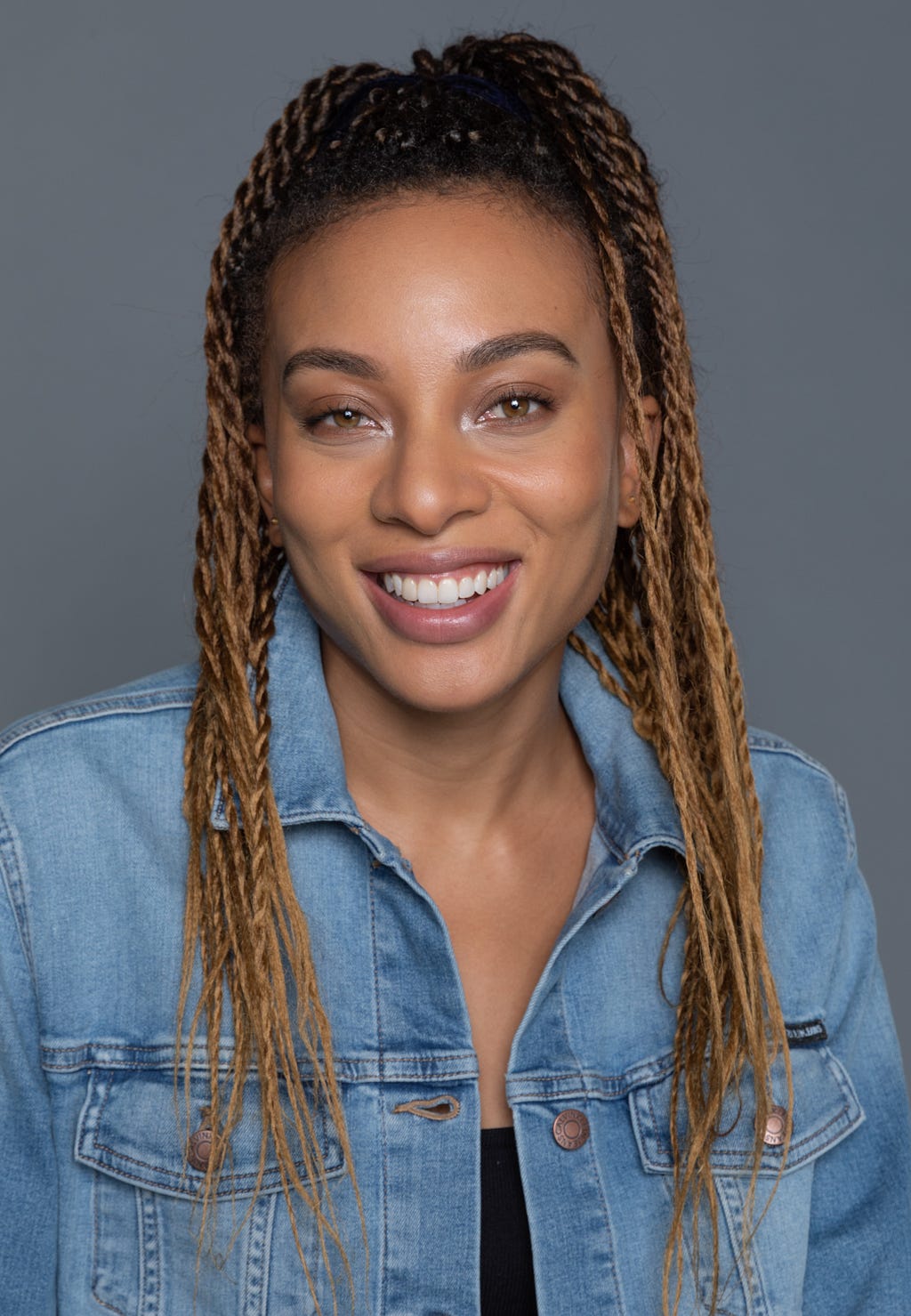
…You don’t always need to be first — In my opinion, the culture of immediacy has really hurt the news industry. The internet allows you to get information out there quickly but that also means that information will spread quickly. I think we all need to just slow down. A journalism professor of mine always said you’d rather be right than first. And in the age of the internet, that’s more important than ever.
As a part of our series about “the 5 steps we can take to win back trust in journalism” I had the distinct pleasure of interviewing Ashley Alese Edwards.
Ashley Alese Edwards is the U.S. Partnerships Manager at Google News Lab. She is passionate about diversity in news media and has promoted this through her involvement in media literacy and inclusion programs. Before Google, she worked at multiple journalism outlets and still freelances on occasion.
Thank you so much for joining us. Before we dive in, our readers would love to ‘get to know you’ a bit better. Can you share with us the “backstory” about how you got started in your career?
As a child, I always wanted to be a reporter or TV news anchor. I graduated from St. John’s University with a degree in Journalism and worked as a journalist for nearly 7 years at publications like Refinery29, Mic, the New York Daily News, and other local news outlets. As a journalist, I covered women’s issues such as abortion, domestic violence, gun violence, and politics. I still freelance in the beauty and lifestyle space but I am now the US partnerships manager in Google News Lab, working with newsrooms and news associations.
A lot of what I do is focused on diversity. Being a journalist showed me how important newsroom diversity is. Your job as a journalist is to report the facts accurately. But people and communities have different experiences. You can easily miss nuance and important information if you’re not even aware of it. That’s why it’s so important to have journalists from different backgrounds in newsrooms.
Do you have a favorite book that made a deep impact on your life? Can you share a story?
The Giver by Lois Lowry had a huge impact on me when I first read it in middle school and it remains one of my favorite books. The whole premise of the society in the book is that “Sameness” is needed to avoid pain and conflict. Things are seemingly utopian because everyone is “equal.” But as the story goes on, it’s clear that’s not the case. The lesson I took away was that pretending there are no differences is actually harmful and oppressive. There’s strength in acknowledging and celebrating our differences and diversity.
Can you share the most interesting story that occurred to you in the course of your career?
One of the pieces I’m most proud of is the cover story I did for Glamour magazine’s hair issue. The focus was the discrimination Black women face at school and in the workplace over their hair. This is something most people don’t even think about but in reality, hair discrimination is perfectly legal in the majority of U.S. states and it’s an issue that impacts Black women the most. Up until fairly recently, locs were not allowed in the U.S. Army. There are still schools that have rules against certain hairstyles, like braids. We’re finally redefining what “professional” hair means.
I was really proud to share the stories of women who have been impacted by hair discrimination and help bring the conversation to the forefront.
Can you share the most humorous mistake that you made when you first started? Can you share the lesson or take away that you learned from it?
I managed social media at my first job and once accidentally tweeted something meant for my personal account on the main account. Thankfully, it was something innocuous so I was able to delete it without any fanfare. The lesson I learned was to look and think before I tweet, which is honestly good advice for anyone.
What are some of the most interesting or exciting projects you are working on now?
In my role at Google, I’ve had the opportunity to work with news publishers to develop and implement new journalism programs and initiatives. My work is focused on newsroom diversity and helping publishers leverage data and technology to tell compelling stories.
Last year, the Google News Initiative (GNI) continued our commitments to bolstering media literacy through partnerships with PBS NewsHour’s Student Reporting Labs, News Literacy Project, and Poynter’s MediaWise program. These efforts aimed to arm communities with the tools needed to spot a fake story when they see it and stop it in its tracks.
The GNI also partnered with VideoOut, a nonprofit organization created to amplify queer voices, and Men’s Health magazine, to create a literacy tool using Google Trends data to promote inclusive LGBTQ+ language. The tool aims to guide journalists through the complex world of LGBTQ+ vernacular, showing who should be credited when using words that belong to marginalized communities and arming reporters with the knowledge to use LGBTQ+ terminology respectfully and accurately.
I’ve also had a hand in shaping the Google News Initiative Fellowship, which is aimed at developing and supporting students who are interested in careers at the intersection of technology, media, and journalism.
What advice would you give to your colleagues in the industry, to thrive and not “burnout”?
Balance is crucial for everything in life. You need to always take care of yourself and your mental health first. Setting boundaries is important. The 24/7 news cycle has created a culture of always being “on.” It’s not healthy and it’s important that we keep challenging that by being open about mental health.
Ok, thank you for that. Let’s now shift to the main parts of our interview. According to this Gallup poll 45% of Americans trust the mass media. As an insider, are there 5 things that editors and newsrooms can do to increase the levels of trust? Can you give some examples?
- Promote media literacy — It’s important for news consumers to be able to identify reputable sources from mis- and disinformation.
- Support next-gen journalists — Gen Z is changing so much about how we consume and share information. It’s important for the industry to support, listen to, and nurture the next generation of storytellers.
- Bolster diversity in newsrooms and in the stories getting told — Newsrooms oftentimes aren’t reflective of the communities they cover and news consumers are increasingly aware of this lack of diversity. People want to feel represented. In order for stories to be authentically told, you need diversity in a newsroom, just like you need a diversity of sources.
- You don’t always need to be first — In my opinion, the culture of immediacy has really hurt the news industry. The internet allows you to get information out there quickly but that also means that information will spread quickly. I think we all need to just slow down. A journalism professor of mine always said you’d rather be right than first. And in the age of the internet, that’s more important than ever.
- Talk with, not down, to your audience — No one wants to be talked down to. Audiences want more transparency into where their news is coming from and want to feel like they are a part of the news process. Talk to your readers about what they’d like to see and what’s not working.
As you know, since 2016, the term ‘fake news’ has entered common usage. Do you think this new awareness has made a change in the day-to-day process of how journalists craft stories? Can you give some examples?
I think it has made more journalists truly aware of the importance of their jobs and the responsibility it holds. Readers’ trust can’t be taken for granted. The way journalists do their jobs has had to evolve and adapt to how information is being shared now. There are challenges but so much opportunity to form more trusting and symbiotic relationships with readers.
In advance of the 2020 U.S. election, the Google News Initiative and our partners made a commitment to train journalists in every state and Washington D.C. The goal was to empower journalists in newsrooms both big and small through training on digital tools to help them find, verify, and tell news stories online.
We are continuing our training efforts with trusted partners, like the Society of Professional Journalists, the Native American Journalists Association, the National Association of Black Journalists, the National Association of Hispanic Journalists and the Asian American Journalists Association, to train a diverse range of journalists across the U.S. in digital skills, media literacy and skills in covering marginalized communities.
Can you share your “5 Things I Wish Someone Told Me When I First Started” and why? Please share a story or an example for each.
- Always negotiate your salary. When I got my first job, I really didn’t think I had the leverage to negotiate my pay or benefits at all. That was definitely not the case and I likely would have gotten more money if I had asked. Women, always advocate for yourselves!
- Be humble. This is something I really take to heart with my job at Google. I always approach each partnership with the attitude that I have so much to learn from the people I’m working with.
- Set boundaries. As a journalist, I had some pretty rough schedules. I interned overnight for the morning shows at CNN. At a previous job, I started work at 5 a.m. for a bit and would sometimes end up doing work when I got home. This isn’t sustainable and I really had to advocate for myself to get a more livable schedule. You’re not always going to get the hours you want and journalists work long hours but there are ways you can set boundaries like not reading emails after a certain time.
- Don’t be afraid of switching jobs if it’s not right for you. I remember in college it was always hammered into my head that it was bad to leave a job before six months and hiring managers would see you as a “job hopper.” I had one job that I was really unhappy at for a lot of reasons and wasn’t taking my career in the direction I wanted. I left after six months and it was the best career decision I made. No job is perfect and I’m not saying to quit everything at the first brush of discomfort but you shouldn’t feel you need to stay in a toxic environment because of some arbitrary rule.
- Don’t be afraid to switch directions. Careers aren’t linear. There’s no one path. I used to have a very narrow view of what working in journalism meant and if I stuck to that, I would’ve never had the job I have now.
You are a person of enormous influence. If you could start a movement that would bring the most amount of good to the most amount of people, what would that be? You never know what your idea can trigger. 🙂
When so many people are saying something mean on the internet, try saying something nice instead. In this age, it seems like a radical act!
How can our readers follow you on social media?
You can find me on Twitter, Instagram and LinkedIn. Additionally, you can also follow the Google News Initiative on Twitter and LinkedIn.
Thank you so much for your time you spent on this. We greatly appreciate it, and wish you continued success!
Google’s Ashley Alese Edwards: 5 Steps We Can Take To Win Back Trust In Journalism was originally published in Authority Magazine on Medium, where people are continuing the conversation by highlighting and responding to this story.
